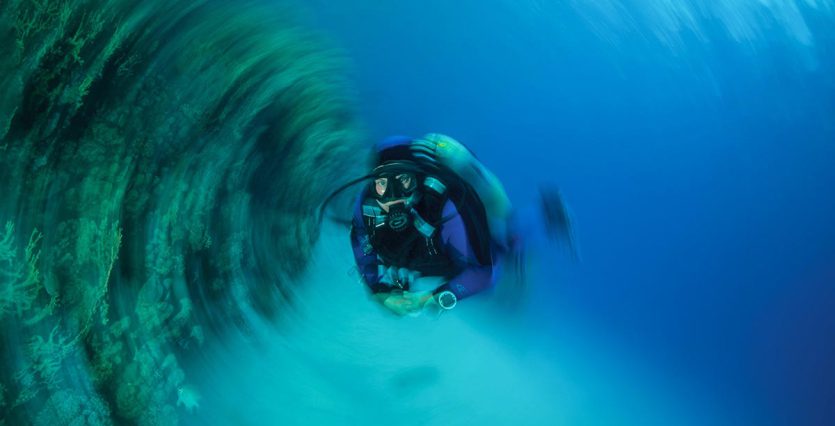The sheer number of unique conditions that can trouble divers underwater is enough to make your head spin. From decompression sickness to gas embolisms to marine envenomations, there are plenty of problems to prepare for, and it takes effort to keep up with the latest research and treatment protocols. Conditions both rare and commonplace can put divers at risk, and it’s important to know how to identify those most likely to cause injury if they do occur. Alternobaric vertigo is one of the less-common conditions that can put a diver in danger quickly. Here’s what you should know about this pressure-related condition that can cause your students to become disoriented at depth.
Cause and Effect
Alternobaric vertigo is the feeling of your surroundings spinning around you (vertigo), caused by a difference in pressure between the two middle ears. The condition most often arises during ascent or descent as ambient pressure changes, and the pressure in one or both middle ears is not equalized. This means that the condition can be caused by failure to equalize during the dive, although it’s worth noting alternobaric vertigo most often appears during ascent rather than descent.
Audiovisual symptoms, including the perception that the body or its surroundings are spinning, involuntary rhythmic movements of the eyes, and nausea and vomiting can occur. A feeling of fullness, ringing, or muffled hearing in one or both ears may occur before symptom onset. Hissing or squeaking (indications of inadequate equalization) often occur as well, and incident data indicates that women may be slightly more susceptible than men.
Physiologically the symptoms are the result of the several factors. The pressure differential can lead to unequal stimulation of the fluid-filled semicircular canals of the vestibular system, which interprets head motion and orientation for balance. Differences in pressure on the right and left cochlea, which use sound stimuli to provide balance and source localization, can also result in vertigo.
Prevention
The good news is that alternobaric vertigo is rarely serious and many cases resolves quickly and goes unreported. It can also be prevented easily, and the chances of a serious injury are small if symptoms are recognized early. If, however, a diver fails to recognize the condition during onset, it can be easy for them to lose control of their position in the water, and a serious incident may result.
The risk of alternobaric vertigo increases with any condition that causes inflammation or congestion of the ears and sinuses or difficulty equalizing. This risk can be minimized by ensuring easy equalization and adequate sinus function before a dive, combined with equalizing early and often during the dive. Symptom onset is usually rapid, but in most cases the symptoms will disappear nearly as quickly as they came on — extended periods of serious vertigo are rare with alternobaric vertigo.
Divers who experience symptoms during a dive should focus on staying still, maintaining their position in the water column and gently equalizing. Symptoms should subside in a matter of seconds or minutes. Vertigo lasting more than a few minutes may indicate a more serious condition, such as a barotrauma of the inner ear or an eardrum perforation.
For more information on alternobaric vertigo, visit DAN.org/Health.


